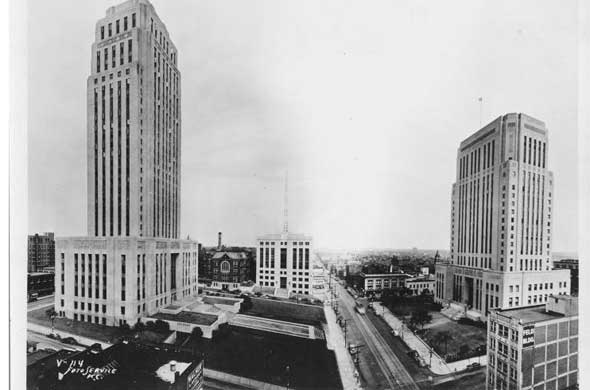
The state has controlled Kansas City’s police department since alleged corruption in 1932. But now city hall and the police department (seen here in a historical photo) will discuss returning the department to city control. Photo courtesy Kansas City Public Library Missouri Valley Room.
Mayor Sly James announced Thursday that former mayor Kay Barnes will chair a commission to study returning the police to city control.
Since a statewide vote last year that gave St. Louis local control of its police, the Kansas City police department is the only one nationwide governed by a board appointed by a governor.
Barnes and Pat McInerney, who recently was president of the police board, will co-chair a 30-member blue ribbon commission to study local control. They are to make formal recommendations by October.
“Consensus is possible, even on difficult issues, when we ask our citizens for input and move forward with hard data and facts,” James said in a press release. “I look forward to hearing their recommendations.”
Under the current system, the governor appoints four citizens to serve on the board and the fifth board member is the mayor of Kansas City. That has been in place since 1939, when the new governor board hired a police chief who fired about half the force.
Before that, police had been controlled since 1932 by the city and somewhat by the Thomas Pendergast political machine. But there was governor control before that and it was not always much better.
From 1874 until 1932, the governor appointed the city police board but police often worked with the Pendergast machine in the 1920s.
The city council passed the 1932 home-rule law that gave the city and in effect the machine police control until the state’s 1939 reform change took it away and returned governor control.
The board of police commissioners website calls the current system “an excellent way to keep politics and corruption out of law enforcement.”
It notes that the board works closely with the city, which funds police. Mayor James is on the board and Councilman John Sharp, chairman of the council’s public safety committee, has a spot on the agenda at every board meeting.
Sharp is also a member of the new blue ribbon commission, as are council members Melba Curls and Ed Ford.



Who’s talking